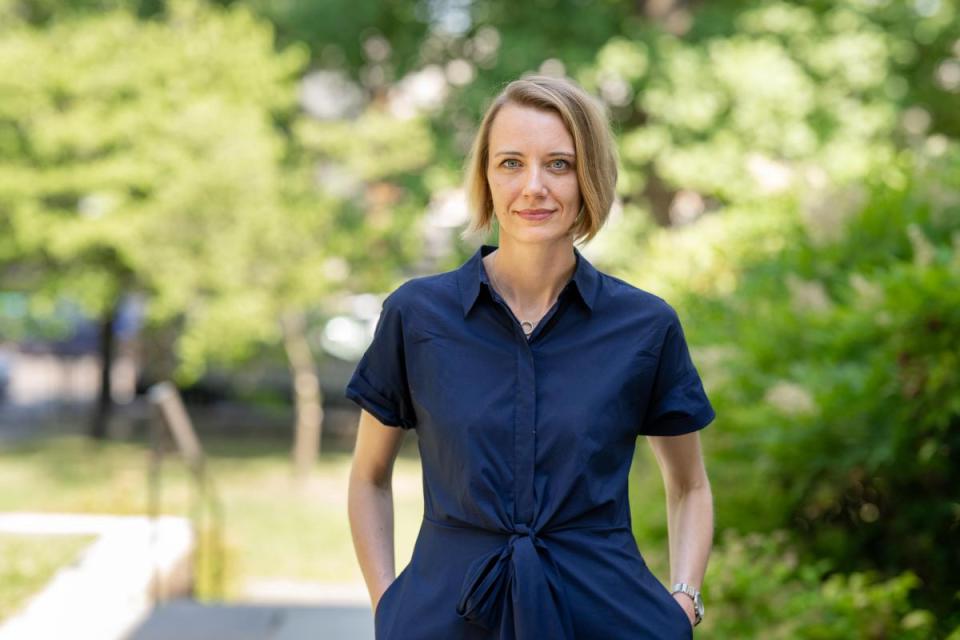Baukje van den Berg (PhD 2016, University of Amsterdam) is a Byzantinist with a background in Classics. Her research concentrates on Byzantine education and literary thought, with a particular focus on the role of ancient literature in Byzantine culture. At CEU, she offers courses on Byzantine literature, culture, and intellectual history, as well as Medieval Greek reading seminars.
Key Publications
Monographs
In preparation: John Tzetzes on Ancient Poetry
Edited volumes
B. van den Berg and N. Zagklas eds. 2024. Poetry in Byzantine Literature and Society (1081–1204): New Texts, New Approaches. Cambridge: Cambridge University Press.
B. van den Berg, D. Manolova, and P. Marciniak eds. 2022. Byzantine Commentaries on Ancient Greek Texts, 12th–15th Centuries. Cambridge: Cambridge University Press.
M.P. de Bakker, B. van den Berg, J.J.H. Klooster eds. 2022. Emotions and Narrative in Ancient Literature and Beyond: Studies in Honour of Irene de Jong. Leiden/Boston: Brill.
J.J.H. Klooster and B. van den Berg eds. 2018. Homer and the Good Ruler in Antiquity and Beyond. Leiden/Boston: Brill.
Articles and book chapters (selection)
2023. Twelfth-Century Scholars on the Moral Exemplarity of Ancient Poetry. Greek, Roman, and Byzantine Studies 63: 103–129 [available here].
2022. Eustathios of Thessalonike on Comedy and Ridicule in Homeric Poetry. In Byzantine Commentaries on Ancient Greek Texts, 12th–15th Centuries. Ed. B. van den Berg, D. Manolova, and P.T. Marciniak. Cambridge: Cambridge University Press.
2022. How to Write and Enjoy a Tale of Disaster: Eustathios of Thessalonike on Emotion and Style. In Emotions and Narrative in Ancient Literature and Beyond: Studies in Honour of Irene de Jong. Ed. M.P. de Bakker, B. van den Berg, J.J.H. Klooster, 716–727. Leiden/Boston: Brill. [DOI]
2021. Playwright, Satirist, Atticist: The Reception of Aristophanes in Twelfth-Century Byzantium. In Satire in the Middle Byzantine Period: The Golden Age of Laughter? Ed. P.T. Marciniak and I. Nilsson, 227–253. Leiden/Boston: Brill. [DOI]
2021. Eustathios’ Homeric Commentaries: Translating Homer and Spoliating Ancient Traditions. In Spoliation as Translation: Medieval Worlds in the Eastern Mediterranean. Convivium Supplementum. Ed. I. Jevtić and I. Nilsson, 116–131.
2020. John Tzetzes as Didactic Poet and Learned Grammarian. Dumbarton Oaks Papers 74: 285–302. [available on JSTOR]
2018. Homer and the Good Ruler in the ‘Age of Rhetoric’: Eustathios of Thessalonike on Excellent Oratory. In Homer and the Good Ruler in Antiquity and Beyond. Ed. J.J.H. Klooster and B. van den Berg, 219–238. Leiden/Boston: Brill. [DOI]
2017. The Wise Homer and His Erudite Commentator: Eustathios’ Imagery in the Proem of the Parekbolai on the Iliad. Byzantine and Modern Greek Studies 41.1: 30–44. [DOI]
2017. Eustathios on Homer’s Narrative Art: The Homeric Gods and the Plot of the Iliad. In Reading Eustathios of Thessalonike. Trends in Classics Supplementary Volumes 46. Ed. F. Pontani, V. Katsaros, and V. Sarris, 129–148. Berlin / Boston: De Gruyter. [DOI]
2017. ‘The Excellent Man Lies Sometimes’: Eustathios of Thessalonike on Good Hypocrisy, Praiseworthy Falsehood, and Rhetorical Plausibility in Ancient Poetry. Scandinavian Journal of Byzantine and Modern Greek Studies 3: 15–35. [open access]
Recent Courses
Byzantium between Worlds: Literature and Learning under the Palaiologan Emperors and Beyond
Heroes in Komnenian Byzantium [Advanced Medieval Greek Reading Seminar]
Byzantine Texts on Arts and Aesthetics [Advanced Medieval Greek Reading Seminar]
Byzantine Writers on the Lives of Emperors and Saints [Advanced Medieval Greek Reading Seminar]
Byzantine Literature between Court, Church and School
Byzantine Secular Literature (330–1453): Between Tradition and Innovation
Women in Byzantine Literature
Men of Letters: Selected Readings from Byzantine Epistolography [Advanced Medieval Greek Reading Seminar]
Students and Scholars in Byzantium: Education and Erudition in the Medieval World
Historiography II: Grand Debates in Mediterranean History
MA Thesis Seminar
PhD Supervision
2019–2024 Juan Bautista Juan López, 'Manuel Gabalas: Biography, Intellectual Network and Philosophical Thought'
2021– Anja Božič, ‘Praising Saints and Praising Eloquence: Humanist Public Oratory in Honor of St. Jerome’ (with Cristian Gașpar)
2022– Dunja Milenkovic, ‘Competence and Competitivity of a Byzantine Intellectual: The Case of Theodore Prodromos’ (with György Geréby)
2022– Aleksandar Andjelovic, ‘Crossing Discursive Boundaries: Education and Learning in Michael Psellos’ Orations and Letters to Patriarchs and Monks (1050–1078)’, University of Vienna (as external supervisor)
2023– Osman Yüksel Özdemir, 'From Bible to Story Worlds: A Comparative Narratological Approach to Romanos the Melodist and Jacob of Serugh'
2023– Olga Vlachou, 'Social Networks and Prosopography of 12th-Century Byzantium'
